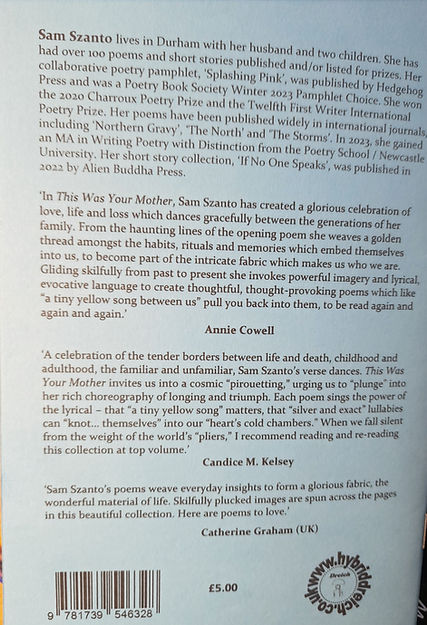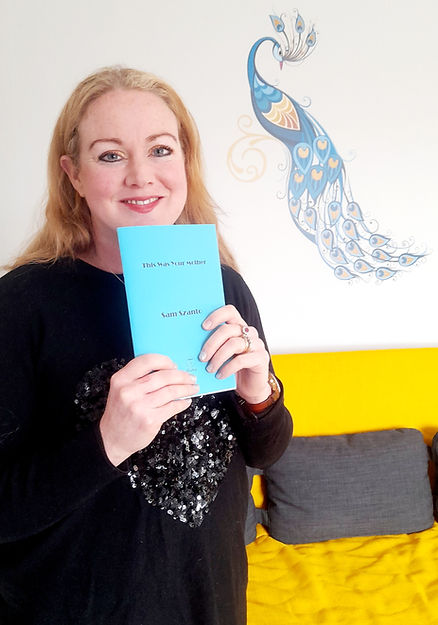20 Questions with... Candice Kelsey
- samszanto2
- Oct 22, 2022
- 6 min read

Candice Kelsey is a poet, educator, and activist. Originally from Cincinnati, she received her Bachelor's degree in English from Miami University, Ohio, with an emphasis on epic poetry.
She has served as a fiction reader for The New England Review and as a poetry judge for Ageless Authors. She has received three Pushcart and two Best of the Net nominations. Her second full-length collection, A Girl / Woman / Teacher / Poet, is out now with Alien Buddha Press (2022) while her debut full-length collection, Still I am Pushing, is out with Finishing Line Press (2020). Candice is the author of Generation MySpace, published by Marlowe & Company (2007), a cutting edge study of how adolescents navigated the vanguard of social media. She mentors emerging writers.
Twitter: @candicekelsey1. Instagram: @candice-kelsey-7 https://www.candicemkelseypoet.com/
Please introduce yourself. Where are you from? What was your life like growing up?
My name is Candice Kelsey, and I am a poet, educator, and activist. I am from Cincinnati, Ohio, but spent the past thirty years carving a life in Los Angeles. I currently live in Augusta, GA. I am the youngest of three children and the only girl; my older brothers are close in age and best friends. I was a lonely child who spent most of my time with my dogs, creating elaborate worlds and adventures together. They were my leopard companions on Mt. Kilimanjaro as well as my rescuing wolves in the Salem witch trials. I did not read as much as I created fantasies and acted them out. I was, however, fascinated by language. I spent three years living in Hong Kong as a child and became smitten with foreign words. When I helped my junior high friend study for her Bat Mitzvah, I dove even deeper into words and today am obsessed with etymology. If I could go back to school, I’d study linguistics for sure.
Did you always want to be a writer? If you also work, what do you do / did you do?
I wanted to perform in musical theatre because of my love for story and all things dramatic. Unfortunately, I couldn’t sing. I fell in love with literature after reading the Transcendentalists in high school and found my joy in studying English in college and graduate school. Because high school had been so transformational for me, I chose to teach high school English, and I had a successful career of twenty-four years. Recently I left education to write for a non-profit organization devoted to protecting animals.
Tell us about your most recently published work in a sentence.
My newest collection, which is my second full-length book of poetry, is titled A Poet and is a bildungsroman in verse, following an everywoman of sorts as she transforms from girl to woman to teacher and eventually accepting her identity as a poet.

What are you working on right now?
I am submitting a chapbook that is inspired by the Choose Your Own Adventure books, but it has yet to be picked up. I am also submitting another full-length collection that explores life’s more uplifting and humorous elements. It’s my most optimistic collection yet. Otherwise, my father recently passed away, so I’ve been processing a lot through writing new pieces.
Do you have a writing routine, and if so what is it?
The only thing routine about my writing life is that I never ignore an idea. Wherever and whenever one begins percolating, I stop and try to get down even the roughest of drafts. I find when I ignore an idea or put off a poem for later, it dissolves and is gone forever. Luckily I am blessed with a supportive family and a somewhat flexible job, both of which allow me the freedom to step away for bit to chase a poem.
Where do you write – always in the same space, or different places? Can you write ‘on the move’?
I write anywhere and everywhere. But writing does not always mean getting the words down. Writing—to me at least—is thinking, deeply contemplating, and playing with images, concepts, truths. I say that to clarify that the work of thinking is essential to the work of writing, and one cannot happen without the other. Thinking can happen while I’m driving my son to baseball practice while writing, that is typing, a poem cannot. But that poem I eventually do type is born of that thinking down Mullikin Road.
What advice do you have for other authors who are starting out? What is the best advice you’ve heard?
When a situation, an image, a word, or even a connection strikes you, stop and write it down. Get back to it immediately or as soon as you can. Don’t ignore those initial sparks, or they’ll fizzle out. Also, read as much poetry as you can! There are so many amazing poets to read and enjoy or learn from that I believe reading other voices should be tops on the To Do list for a poet. When a new poet is frustrated that the words won’t come or the poems aren’t flowing, it’s time to devour all the poems that are out there. I have learned so much from delving deeply into poets like Jose Hernandez Diaz and Taylor Byas and Shareen Murayama to name a few. Just engaging with a different rhythm, voice, syntax and feeling the pulse of new line breaks and form is so very important as a writer.
Do you enjoy doing live readings or are they a necessary evil – or somewhere in between?
I really love live readings and am sad that these past two years shut much of it down. Whoever’s reading this – invite me to a live reading! Connecting with other people through poetry is about as good as it gets, in my opinion. I am severely introverted, more so even in the past year, but I thrive when around other members of the poetry community—listeners, readres, or other poets—because the engagement is authentic. There’s no agenda or positioning or baggage. We are all just excited to hear good poems and delight each other’s creativity.
Are there recurring themes in your work? Where do you feel these emanate from if so?
Lately there are ecological themes. My concern for creation and frustration over the climate catastrophe seems to be permeating my poems more and more, usually more by way of imagery. Because I live in a misogynistic culture, my poems often reflect a feminist point of view as I come to terms with patriarchal systems, expectations, and toxicity. As a survivor of sexual assault and toxic body messages, I am drawn to exploring the connections between flesh and spirit. Also, I tend to write about personal matters often centering around my own children.
Should writers have a moral purpose? What is the purpose of a writer in today’s society?
I don’t thing writers “should” do anything in particular, but I believe the purpose of a writer in today’s society is to expose truth, create new empathies and connections, and transform violence into beauty.
Do you write between genres or not?
Yes, but not well. I have some micro fiction, creative nonfiction, and even a short story published. My favourite non-poetry publication lately was a craft piece on teaching Basho to my students.
Which living writers do you most admire?
Forrest Gander, Juan Felipe Herrera, Joy Harjo, Ellen Bass, Linda Pastan, Marilyn Chin, Dorianne Laux, Marcus Amaker, Kwame Dawes, Natasha Trethewey and Chelsea Rathburn.
Which dead writers do you most admire?
Phillis Wheatley above and beyond all other. What an amazing human, woman, and poet. Emily Dickinson, Walt Whitman, Gerard Manley Hopkins, Basho, and Anna Akhmatova.
What’s the book you wish you’d written?
Moby-Dick. And 100 Years of Solitude.
What other external influences do you have: nature/place, music etc?
I’m quite influenced by my love for opera, specifically Puccini. Also, I have an embarrassing addiction to the 80’s tv show Murder, She Wrote which seeps into my poetry subtly and often. Finally, I am a person of faith, so I often wrestle with biblical stories and images.
Do you suffer from ‘writer’s block’ and how do you overcome it if so?
I would be a liar if I said no. However, I have learned to be content with periods of dormancy. When the poems are not percolating, I am able to find peace in waiting. After all, so much of life is waiting, and the more comfortable we become with it the easier things will be. So as I wait, I read other poets.
What’s been your favourite reaction to your writing?
A poet I admire said, “I’m a fangirl of your work!” Also, my therapist has bought both my books and keeps track of which poems are her favorites.
How do your family and friends feel about your writing?
I have supporters who applaud it all, and for them I am grateful. I also have detractors who reject my writing for whatever reason. And that’s fine. Truth is not easy for most people.
Do you have a favourite bookshop?
I love the Last Bookstore in downtown Los Angeles. It’s just phenomenal, a real experience. They even host weddings it’s that cool.
How do you see the future of writing? Will we become more or less dependent on Amazon?
Could anything be more complicated than our relationship with Amazon? I’ll let that be my answer. And the future of writing is bright—so very bright. Just read all the amazing new voices around us.











Comments